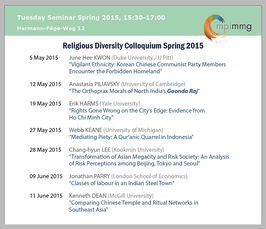"Spiritual Topographies of Ruination and Reconstruction in Vinh City, Vietnam"
Religious Diversity Colloquium Spring 2015
- Datum: 30.06.2015
- Uhrzeit: 15:30 - 17:00
- Vortragende: Christina Schwenkel (UC Riverside)
- Christina Schwenkel is Associate Professor of Anthropology and Southeast Asian Studies at the University of California, Riverside. She has conducted extensive ethnographic research in Vietnam on the transnational co-production of postwar memory and postwar reconstruction of urban infrastructure. She is the author of The American War in Contemporary Vietnam: Transnational Remembrance and Representation (Indiana University Press 2009) and a co-edited special issue of positions: asia critique (with Ann Marie Leshkowich) on “Neoliberalism in Vietnam” (2012). Her most recent publications examine the global Cold War as a civilizing project through socialist circulations of knowledge, labor, and technology between Vietnam and East Germany, including Vietnamese contract workers and architecture students in the GDR (Critical Asian Studies; Central and Eastern European Migration Review) and East German urban planning and reconstruction of Vinh City (Cultural Anthropology; International Journal for History, Culture and Modernity; American Ethnologist). She is currently writing a book entitled, Planning the Postwar City: East German Urban Designs and their Afterlife in Vietnam. Schwenkel will be a fellow at the American Academy in Berlin during the fall semester, 2015.
- Ort: MPI-MMG, Hermann-Föge-Weg 12, Göttingen
- Raum: Conference Room

For more details please contact vdvoffice(at)mmg.mpg.de.
In October 1968, at the apex of the air war in Vietnam, US bombers descended on Vinh City, destroying the eighteenth century Diệc Pagoda that was once the cultural center of the provincial capital. Only the front gate was left standing. Today, as one of the last material ruins of war in the city, the pagoda’s remains have been designated a site of historical and architectural heritage. For urban residents, this symbolic space has become the focus of renewed religious practices in the city through the spontaneous, makeshift reconstruction of the pagoda and its altars. In the paper, I trace the social life of Diệc pagoda, from its role in anti-colonial revolution and its abandonment in the postwar years, to its interference with East German reconstruction and its current reanimation by local devotees. I argue that religious ruins, such as those of Diệc pagoda, have become a powerful force in the remaking of socialist urban landscapes. And while contemporary practices at Diệc Pagoda speak to the expansion of spiritual topographies across post-reform Vietnam, they also reveal an ambiguity, or fuzziness, between secular state bureaucracy and discouraged superstitious beliefs as urban religiosity works to both affirm and subvert governmental authority and state developmental strategies.